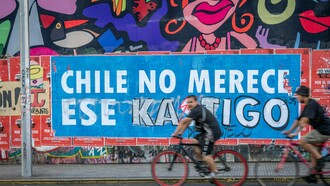17 October is traditionally the International Day for the Eradication of Poverty. This concerns the rights of poor people, which are, of course, the rights of all of us. However, for poor people, these rights are not self-evident; special efforts are needed to guarantee vulnerable people a dignified life.
There are reasons to believe that we are well on our way to achieving this. In 1990, the World Bank renewed its slogan: 'We have a dream. A world free of poverty. Even then, some said that it would always remain a dream. But the UNDP came up with an interesting concept of 'human development'. In the 1990s, the UN organised a whole series of interesting world conferences on the environment, human rights, women, social development, habitat... It was a hopeful period after the end of the Cold War. We were on our way to a world without major ideological conflicts, with development for all.
Thirty years later, the disappointment is great. Poverty has indeed hardly decreased. At first glance, it has fallen spectacularly worldwide, from 1.9 billion to 808 million, but this is mainly due to the rapid development of China and India. In most African countries, poverty remains sky-high. A few months ago, the World Bank had to revise its figures again, adding another hundred million poor people. And its 'poverty line' remains, in its own words, incredibly low, at barely 3 US dollars a day!
A new attempt
Thirty years after the first UN conference on social development in Copenhagen, a second conference will be held in early November this year.
There are not many reasons to be optimistic, given the shifting geopolitical and ideological balance towards extreme right-wing conservatism. But it is important that this conference takes place, if only to repeat and reaffirm a few powerful principles from 1995.
In 1995, there were three important chapters: poverty, employment and social integration. They will be repeated this year, with no significant new additions. However, the cross-cutting issues addressed are important: the importance of food security, access to land, price stability, universal healthcare, quality education and lifelong learning, just transition, gender equality, housing, migration and financing.
Unfortunately, inequality is not given priority, even though this pressing problem is closely linked to poverty, employment and, certainly, social integration. Increasingly, the impression is being created that social policy is only there for poor and vulnerable people. Those who are slightly better off can make do with private insurance on the market.
It is also noteworthy that the political declaration that accompanied such a conference in 1995 was formulated in terms of commitments. This is not the case now.
There are two important questions that need to be asked here.
The first, perhaps somewhat provocative, is whether poverty is a good priority for policy. And the second is whether a world without poverty is also a just world.
Is poverty reduction a good objective?
The question may surprise you, but how I arrived at it is a long story that I have explained before. When the World Bank unveiled its new slogan, it sounded tremendously good, especially for a financial institution that was then mostly known for the strict austerity policies it imposed on poor countries, along with the IMF.
A thorough analysis of all documents published by international organisations at the time revealed some sobering facts. No statistics on global poverty existed, the strict austerity policies did not change, and there was no real mention of any social policy. On the contrary, international organisations constantly said that social security was not for poor countries and only benefited the 'privileged' civil servants and military.
The proposed poverty policies were clearly insufficient and ineffective because they were perfectly compatible with neoliberal policies. According to the World Bank, the main person responsible for poverty policies should always be ... the finance minister!
Under the label of 'poverty reduction', complicated procedures and mechanisms were devised to force poor countries further into the neoliberal straitjacket, while social services were privatised.
In the European Union, the old anti-poverty programmes were abolished due to a lack of competencies in the treaties. New poverty targets were included in several programmes from 2000 onwards, but real powers are still lacking.
In the meantime, a profound shift in meaning has taken place, making social protection something different from what it used to mean, now at the service of the economy and no longer of people and their living standards. In this way, poverty has become an ethical problem rather than a class problem.
Despite all solemn promises, poverty rates are not really falling, as said before.
There are many ways to get around the poverty priority. Biased definitions – putting the focus on all side phenomena instead of on income – and the lack of willingness to tackle inequality are the main ones. Dismantling welfare states, the most perfect way to prevent poverty, is another one. Moreover, philanthropy and charity, the way to discipline and even sanction poor people, as well as the weakness of many social NGOs, can only jeopardise the conditions imposed on poor people.
Real solutions can only come from a political commitment to provide income guarantees, decent work with decent wages, welfare states with social security, public services and labour law, and a fair tax system to tackle inequality.
Can the Second World Social Summit achieve these goals?
A world without poverty is not a just world
I asked ChatGPT why we do not yet live in a just world if we are eradicating poverty. Within 30 seconds, I received three pages of text explaining material and other needs. A human being must also be able to lead a good life, and every human being desires recognition. It talked about all possible forms of discrimination and, in the last sentence of the conclusion, about 'all forms of inequality'.
That is a problem. Discrimination is not inequality. Those who want to combat inequality strive for more equality, more redistribution, good social protection and a fair tax system.
Discrimination indicates that we are not all the same and therefore need differentiated policies to make equal rights a reality. People are different and always will be. And precisely because people are different – in terms of gender, religion, ethnicity, colour, health and much more – policies will have to adapt to guarantee those equal rights. If there were no differences, if we were all identical, the demand for equal rights would be superfluous.
This is a common misconception. All differences and inequalities are lumped together, making it inevitable that some essential things will be overlooked. We can no longer see the forest for the trees.
Take income inequality, for example. Some institutions, such as the World Bank or the IMF, find it extremely difficult to make this a topic of political debate. They prefer to talk about equity or fairness.
Or take the income dimension of poverty. People constantly talk about all possible aspects – energy poverty, transport poverty, menstrual poverty, etc. – but never or only rarely about food poverty or income. Yet it is precisely income poverty that is at the heart of the problem if we want to make people self-reliant and enable them to achieve economic and financial autonomy.
When you look at poverty as an income problem, you quickly realise that growing global inequality is an obstacle to effective poverty reduction. The two are linked. What is fair about a society in which the bottom layer lives on the poverty line and the top layer earns and owns a hundred, a thousand or ten thousand times more?
Poverty is created day after day, by economic reforms, by the dismantling of welfare states, by pension reforms, and by the insurmountable bureaucracy that vulnerable people seeking help have to face. We live in a poverty factory. At the same time, income and, above all, wealth inequality are growing, and tax breaks are being given to those who already have more than enough. It is a global problem.
Discrimination, inequality and poverty remain unacceptable in the rich world we live in. They prevent us from working towards a more just world, with a common language and common values, above all differences. Today, the worlds of the rich and the poor are incompatible.
Moreover, we are once again moving towards more conservative policies, which also means a world that is resistant to change. A world in which people are born into a group, rich or poor, and are condemned to remain there forever. This is also the philosophy of the far right. Society is like an organism in which each element has its proper function: you are who you are, and you stay where you are. Emancipation is destructive and impossible anyway.
By giving 'poverty' and 'inequality' all kinds of different meanings, it becomes very difficult to convey a message of care for people and society and of justice. We then forget that our economic system needs poverty and that inequality is by no means a driver of the economy, quite the contrary. There is no 'trickle-down' effect with a distribution of wealth. There is only a desire for more and more wealth at the expense of those who do not belong.
For liberalism, inequality is not a problem. We therefore pretend to fight poverty because it costs nothing and is politically safe. Poverty policy is then entirely compatible with neoliberalism. Solidarity, from each according to their ability and to each according to their needs – the principle of social security – is completely at odds with this. No wonder they want us to believe that the welfare state and public services are becoming 'unaffordable'.
Social security is a human right. Together with a fair tax system, it also contributes to the fight against inequality, both of which work on the basis of redistribution. And they contribute to a world of peace and security.
Poor and vulnerable people must be helped, but this is not achieved primarily through poverty reduction policies. After all, no one is born poor; it is our societies and our economic system that make people poor. Poverty reduction can never be enough. Poverty must be made illegal; it has no place in our rich world.















